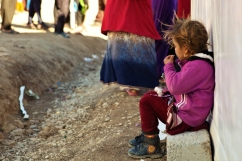Islamic State fighters have stepped up counterattacks on Iraqi forces in Mosul amid bad weather as the U.S.-backed offensive to capture their last major city stronghold in Iraq enters its third month.
With cloudy skies hampering coalition air surveillance, the militants carried out attacks in three districts of eastern Mosul, al-Quds, Ta'mim and al-Nur, over the past four days, residents and security officials said on Friday.
"We heard clashes and explosions and then somebody shouting on the loudspeaker of the mosque 'Allahu Akbar, Allahu Akbar, the Islamic State is staying'," said a Ta'mim resident.
The campaign that started on Oct. 17 has turned into the biggest battle in Iraq since the U.S.-led invasion that toppled Saddam Hussein in 2003.
The humanitarian situation of the besieged population is causing alarm amid reports of food, water and fuel shortages, while the fighting is making access to hospitals difficult.
Nearly 100,000 people have fled the city, according to the International Organization for Migration.
More than 100,000 Iraqi soldiers, Kurdish fighters and Iranian-backed Shi'ite volunteers are taking part in the offensive. The latter are attacking the militants supply lines in a remote and semi-desert area west of Mosul to avoid fanning sectarian tensions with the city's Sunni population.
The Iraqi military estimate the number of militants in the city at 5,000 to 6,000. They are dug in amid the city's remaining population of about one million, moving through tunnels and using suicide car bombs, sharpshooters and mortar fire to slow the advance of the Iraqi forces.
A mainly western coalition is providing air and ground support to the offensive, led by the U.S. with more than 5,000 troops deployed in Iraq.
The fall of Mosul would mark the defeat of the ultra-hardline Sunni group in the Iraqi half of the caliphate that also extends over parts of Syria.
The city is by far the largest seized when they overran about a third of Iraq in 2014 and is the place where their leader, Abu Bakr al-Baghdadi, declared his theocratic dictatorship.
At the current pace of advance, the offensive is likely to extend into next year, beyond the initial forecast of Prime Minister Haider al-Abadi who pledged to take the city in 2016.
The U.S-trained Counter Terrorism Service, which is spearheading the fighting inside the city, has so far taken about half of its eastern side. Mosul is divided in two parts by the Tigris River that runs through its centre.
Four of the city's five bridges have been destroyed to hamper the movement of the militants and their ability to bring car bombs and weapons from the western side. The fifth was also hit, but only at its edges, only allowing pedestrians to cross.
Iraqi forces are holding off using field artillery and air bombardments to avoid civilian casualties, hoping to wear down the militants' resistance, depleting their numbers and their stock of car-bombs, two analysts in Baghdad said.
"It is a matter of time before Daesh are defeated inside Mosul," said Ihsan al-Shammari, who heads the Iraqi Centre for Political Thought think-tank. "Their ammunition and equipment are being depleted."
The Iraqi government also hopes that internal uprisings would break out against the militants, facilitating the advance of the army. These haven't happened so far because Islamic State, in the first days of the offensive, killed and detained hundred of ex-members of the security forces it deemed hostile to its harsh rule.
No estimate for civilian casualties has been given by the warring sides. The United Nations last month said the fighting in eastern Mosul was overwhelming the capacity of the government and international aid groups.
The United Nations earlier this month said nearly 2,000 members of the Iraqi security forces were killed across Iraq in November, a figure Iraq denied without indicating the losses among its troops.

















